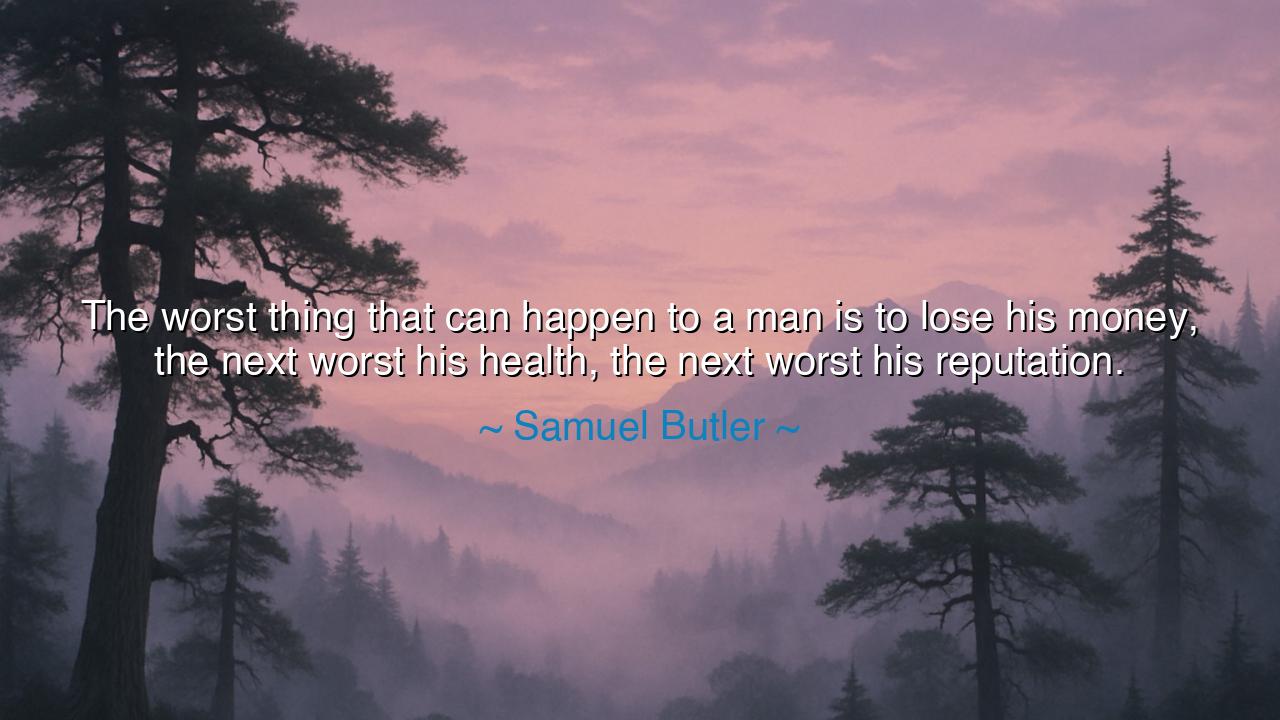
The worst thing that can happen to a man is to lose his money
The worst thing that can happen to a man is to lose his money, the next worst his health, the next worst his reputation.






“The worst thing that can happen to a man is to lose his money, the next worst his health, the next worst his reputation.” — thus spoke Samuel Butler, the English satirist and philosopher whose wit concealed a soul of piercing clarity. Though his words may seem worldly at first, they hide within them the ancient hierarchy of human misfortune, a ladder descending from wealth to well-being to honor. Butler does not glorify materialism, but rather observes with a keen and ironic eye how the world itself measures loss — for to many men, money, health, and reputation are the pillars upon which their entire existence rests. When one crumbles, the others tremble; when all are lost, the man himself fades into ruin.
In the first part of the saying — “the worst thing that can happen to a man is to lose his money” — Butler speaks not only of coins and possessions, but of security, that fragile illusion which shields the human heart from fear. In every age, wealth has been mistaken for stability, and men have built their peace upon the sands of fortune. When the tide of life withdraws and the sands shift, they discover that money was never their foundation, only their comfort. Yet Butler does not condemn wealth itself; he simply reminds us that its loss is a blow that reveals the truth — that prosperity without wisdom is as fleeting as morning mist. Many who lose their wealth find that they have lost not gold, but their sense of self, for they built their worth upon what could never last.
The second calamity, he says, is the loss of health, that silent treasure most neglected until it withers. For what good is gold to the bedridden, or renown to the dying? Health is the engine of every joy, the quiet breath behind every dream. Without it, the pleasures of life turn to dust upon the tongue. Butler understood, as did the ancients, that to be whole in body is to possess the greatest fortune under the heavens. The philosopher Herophilus once declared, “When health is absent, wisdom cannot reveal itself, art cannot become manifest, strength cannot fight, wealth becomes useless, and intelligence cannot be applied.” Thus, health is not the luxury of the fortunate, but the sacred vessel of the soul — and to lose it is to feel the walls of the world closing in.
Yet there remains the third and most subtle of Butler’s trials — the loss of reputation. In this, he touches upon the essence of a man’s relationship to society, for reputation is the reflection of one’s honor in the eyes of others. To lose it is to be cast into the wilderness of distrust, to be stripped of the dignity that binds human beings together. In ancient Greece, to lose one’s good name was a fate worse than death; for a man could rebuild his fortune, could even recover from illness, but to live without honor was to live as a shadow. The poet Homer himself placed eternal glory above the fleeting safety of life. And so Butler, though a man of irony, speaks here with solemnity: the wounds of dishonor strike deeper than those of poverty or pain.
Consider the story of Job, the righteous man of the East, who lost first his wealth, then his health, and finally his standing among men. His friends turned from him, his name became a byword for misfortune, and yet, through suffering, he discovered a truth greater than all — that character endures where reputation fades, and that the soul’s integrity cannot be measured by worldly eyes. In Job’s restoration we find the reversal of Butler’s sequence: though man may lose money, health, and honor, he can regain them all if he preserves faith in his own righteousness. But if his spirit collapses under these losses, then even in wealth and health he is poor indeed.
In Butler’s age — much like our own — the world worshipped the external. Men chased wealth, measured health by appearance, and feared scandal more than sin. His quote stands as both observation and admonition: that we live in a society where the value of the soul is hidden beneath the trappings of success. Yet the wise know that the true order of worth is reversed. The greatest treasure is virtue, the next health, and the last money — for character, not circumstance, defines a man’s immortality. Butler, ever the satirist, invites us to reflect not on the foolishness of losing, but on the folly of valuing the wrong things first.
The lesson, then, is this: guard your health, but more than that, guard your honor. Earn your bread with dignity, but do not sell your soul for gold. When wealth departs, work patiently; when health fails, endure bravely; when reputation suffers, live so that truth will one day restore it. For what is truly worst is not the loss of money, or health, or name — but the loss of integrity, which is the root of all three.
So, my children of the fleeting age, remember the wisdom of Samuel Butler. The world may measure success by fortune, but the heavens measure it by faith, virtue, and endurance. Seek not to be rich in gold, but rich in goodness; not famous, but faithful; not merely healthy in body, but whole in spirit. For wealth may vanish, the body may falter, and the crowd may forget your name — but the soul that remains upright in the face of loss is immortal, shining forever in the light of truth.






AAdministratorAdministrator
Welcome, honored guests. Please leave a comment, we will respond soon